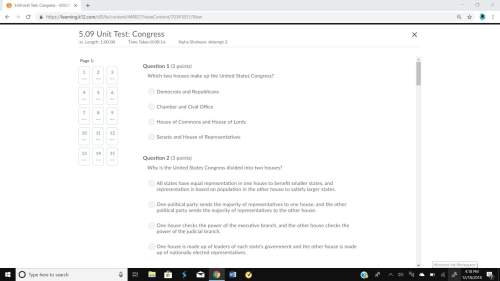99
1. most democratic nations have economies.
a. mixed
b. traditional
c. c...

Social Studies, 27.09.2019 19:30 deejay4354
99
1. most democratic nations have economies.
a. mixed
b. traditional
c. command
d. market
2. which is an example of investing in capital goods by a company?
a. providing health care for workers
b. providing classes for workers to learn new skills
c. keeping an old machine to see if it will last longer
d. buying new computers to build products more quickly
3. when a government decides to increase a tariff, it increases the amount of a tax placed upon
a. people’s income
b. imported goods
c. renewable resources
d. people’s property
4. who sets the price for goods in australia?
a. buyers and sellers agree upon price
b. the governor-general sets prices for most goods
c. parliament sets a price for all goods in the country
d. prices for goods are set based on customs and beliefs of the aborigines
5. what do the economic systems of the australia, brazil, mexico, & canada have in common?
a. all are examples of pure market economies
b. all are examples of mixed economies
c. all are examples of traditional economies
d. all are examples of command economies
6. which has the most power in australian government?
a. the constitution
b. the people of australia
c. the queen
d. the high court of australia
7. which describes the government of the country of australia?
a. federal government
b. unitary government
c. autocratic government

Answers: 2


Other questions on the subject: Social Studies

Social Studies, 21.06.2019 15:30, edmundg2238
The kansas-nebraska act allowed the territories of kansas and nebraska to decide the issue of slavery by popular sovereignty. the people who lived in these territories would be able to vote on whether slavery would be allowed there. what effect did this have on kansas? a. settlers voted to allow slavery only in half of the territory. b. kansas became a slave state and joined the confederacy. c. settlers held a series of debates to them decide. d. pro-slavery settlers fought against anti-slavery settlers.
Answers: 1

Social Studies, 22.06.2019 09:10, kevinh2683
In griswold v. connecticut, on what did justice goldberg base his concurring opinion? the protection granted by the constitution the intention of the writers of the constitution the list of rights in the first eight amendments the human rights safe from government intervention
Answers: 1

Social Studies, 22.06.2019 10:40, needhelp9627
Asociologist wants to study a culture that occurs in some women’s prisons: “state families,” in which individual prisoners take on certain roles within a group of like-minded prisoners. there is previous evidence that younger prisoners will use older inmates who play the roles of grandparents as a resource before they will turn to staff for and advice. the lieutenant in charge of a dorm of long-term prisoners offers to gather volunteers to speak to the researcher and also offers to vouch for the integrity of the researcher. the use of this staff is: a valid use of a statistical technique referred to “snowball sampling” wherein the inclusion of the first subject leads to the recruitment of another one subject. a useful tactic in obtaining a sample of prisoners who both meet the criteria and who will be honest with the researcher. wrong and is prohibited; subject selection needs to be free from intervention by prison authorities or prisoners. acceptable only when the researcher’s irb grants a special waiver.
Answers: 1
You know the right answer?
Questions in other subjects:




Geography, 03.03.2020 16:55


Mathematics, 03.03.2020 16:55




Biology, 03.03.2020 16:55




